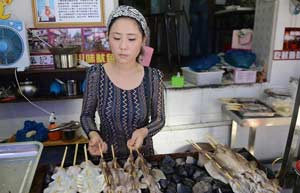

GUANGZHOU -- The financial uncertainties conveyed in the US government shutdown have made the Chinese currency, renminbi, more popular among global traders, although the US Congress has passed a bill to end the debt ceiling deadlock.
Businessmen attending the ongoing China Import and Export Fair, or Canton Fair, in Guangzhou, capital of southern Guangdong Province, said they had encountered wider acceptance of the Chinese yuan among their overseas partners.
"Many overseas banks are now more willing to carry out renminbi business," said Zhang Qingfu, head of the Middle East and Africa overseas business division of Haier Group, China's largest home appliance manufacturer, adding that cross-border trades with China can now be settled in renminbi in many countries and regions.
Zhang said Haier had begun to settle its business in renminbi in countries like South Africa, Iran and Sudan over the past year.
"It used to be us proposing to settle trade in renminbi, but now it is our overseas buyers who are more proactive," he added.
Data from the People's Bank of China (PBOC), the central bank, showed that overseas trade settlement in renminbi totaled 3.16 trillion yuan ($515 billion) in the first three quarters of 2013, more than 50 percent up from the 2 trillion yuan registered in the same period last year.
China first kicked off trials of cross-border trade settlement in yuan in 2009 in Hong Kong, Macao, ASEAN countries and selected other locations. The scheme has now been extended to all parts of China and all countries and regions overseas.
Market analysts say that the unexpected fast development of yuan-denominated settlement is rooted in multiple factors. Yet the looming worries over the US dollar on the global market have undoubtedly contributed to the yuan's internationalization and acceptance within a larger scope.
Compared with the dollar, the advantages of renminbi in trade settlement lie in the relatively low risks in exchange rates and costs, said Gao Yuanjia, director of the overseas business of Chunlan (Group) Corp., also a major producer of home appliances.
"Currencies in some other countries have depreciated significantly over a period of time, hiking the cost of imports," Gao said. "Settlement in renminbi can offload such shocks."
 Aerobatic team prepare for Aviation Convention
Aerobatic team prepare for Aviation Convention
 China Suzhou Electronic Manufacturer Exposition kicks off
China Suzhou Electronic Manufacturer Exposition kicks off
 'Squid beauty' and her profitable BBQ store
'Squid beauty' and her profitable BBQ store
 A day in the life of a car model
A day in the life of a car model
 Vintage cars gather in downtown Beijing
Vintage cars gather in downtown Beijing
 Asia Bike Trade Show kicks off in Nanjing
Asia Bike Trade Show kicks off in Nanjing
 Student makes race car for 4th Formula SAE of China
Student makes race car for 4th Formula SAE of China
 Beijing suburb to hold 2014 APEC meeting
Beijing suburb to hold 2014 APEC meeting